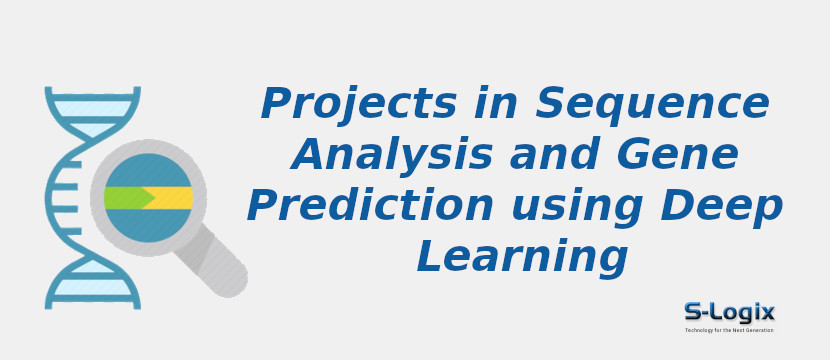Project Background:
The work in Sequence Analysis and Gene Prediction using Deep Learning is grounded in the pursuit of leveraging advanced computational techniques to unravel the complexities encoded within biological sequences. Genomic data, comprising DNA, RNA, and protein sequences, holds the blueprint of life and decoding this information is pivotal for understanding genetic functions and regulatory mechanisms. Traditional sequence analysis and gene prediction methods face challenges in capturing intricate patterns and dependencies within these sequences. Deep Learning has the capacity to learn hierarchical representations from data automatically and presents an innovative approach to address these challenges. This project work seeks to harness the power of deep neural networks, including RNNs, CNNs, and transformer architectures, to learn meaningful features from genomic sequences. By enhancing the accuracy and efficiency of gene prediction and functional annotation tasks, this research aligns with the broader goals of advancing the understanding of genomics, facilitating personalized medicine, and contributing to breakthroughs in biotechnology and healthcare.
Problem Statement
- In sequence analysis and gene prediction, a problem arises concerning the robust generalization of models across diverse genomic landscapes.
-
Despite significant advancements, current models often struggle with adaptability to varying genomic contexts, limiting their performance in real-world scenarios.
-
The challenge lies in developing deep learning architectures capable of effectively learning and extrapolating patterns from different species, genetic variations, and experimental conditions.
-
Moreover, addressing interpretability issues remains a priority as black-box models hinder the translation of predictions into actionable biological insights.
Aim and Objectives
- The aim of the project in sequence analysis and gene prediction using deep Learning is to advance the accuracy, efficiency, and generalization capabilities for decoding biological sequences and predicting gene structures.
-
Design and implement novel deep learning architectures, including RNNs, CNNs, and transformer models tailored for sequence analysis and gene prediction tasks.
-
Improve model generalization across diverse genomic landscapes, ensuring robust performance on well-characterized and less-studied genomic sequences.
-
Explore techniques to enhance the interpretability and enable a better understanding of features influencing gene predictions.
-
Develop strategies to optimize model performance when faced with limited labeled data, addressing challenges associated with noisy or sparse datasets.
-
Investigate integrating multi-omics data sources such as genomics, transcriptomics, and epigenomics to create comprehensive sequence analysis and gene prediction models.
-
Ensure the developed models to the broader field of genomic research by facilitating accurate gene predictions, and insights into biological mechanisms.
Contributions to Sequence Analysis and Gene Prediction using Deep Learning
- Development of novel deep learning architectures tailored for sequence analysis models to capture intricate genomic patterns.
- Strategies to optimize model performance in scenarios with limited labeled data, addressing challenges associated with noisy or sparse datasets.
- Exploration of multi-modal integration, combining information from genomics, transcriptomics, and epigenomics to create comprehensive models for sequence analysis and gene prediction.
- Contribution to the broader field of genomic research by providing functional annotations and insights into biological mechanisms, advancing our understanding of genomics.
Deep Learning Algorithms for Sequence Analysis and Gene Prediction
- Recurrent Neural Networks (RNNs)
-
Convolutional Neural Networks (CNNs)
-
Long Short-Term Memory networks (LSTMs)
-
Transformer Models
Datasets for Sequence Analysis and Gene Prediction
-
ENCODE (Encyclopedia of DNA Elements)
-
GENCODE
-
GTEx (Genotype-Tissue Expression)
-
1000 Genomes Project
-
TCGA (The Cancer Genome Atlas)
-
Roadmap Epigenomics
-
C. elegans datasets
-
FlyBase (Drosophila Genomics)
Performance Metrics for Sequence Analysis and Gene Prediction
- Accuracy
-
Precision
-
Recall
-
F1 Score
-
Area Under the Receiver Operating Characteristic Curve (AUC-ROC)
-
Matthews Correlation Coefficient (MCC)
-
Mean Squared Error (MSE)
-
Cross-Entropy Loss
-
Specificity
-
Sensitivity
Software Tools and Technologies
Operating System: Ubuntu 18.04 LTS 64bit / Windows 10
Development Tools: Anaconda3, Spyder 5.0, Jupyter Notebook
Language Version: Python 3.9
Python Libraries:
1. Python ML Libraries:
- Scikit-Learn
- Numpy
- Pandas
- Matplotlib
- Seaborn
- Docker
- MLflow
2. Deep Learning Frameworks:
- Keras
- TensorFlow
- PyTorch
